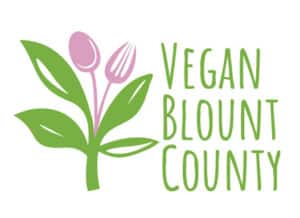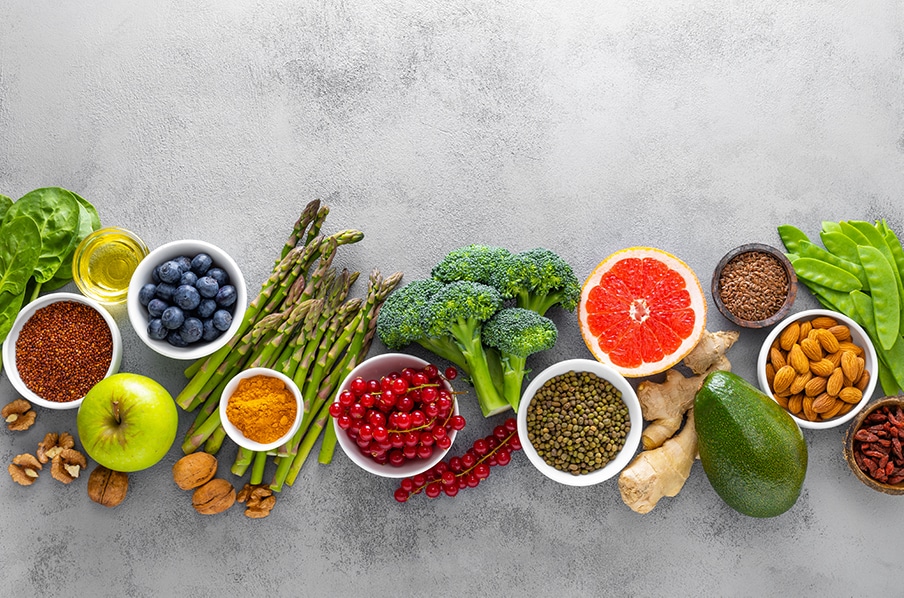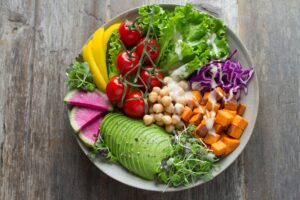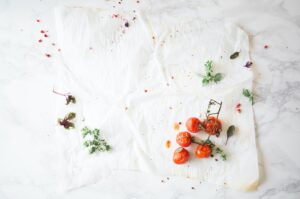- Plant Based Choices: My Reflections - October 2, 2023
For almost 30 years I have been cultivating the idea of becoming a vegetarian. My religion interprets the commandment “Thou shalt not kill” in a broader way, considering anything that is alive. However, it was only last year that I began to understand more deeply what vegetarianism and veganism are, as well as what their impacts would be on one’s health and that of the planet.
Superlife
Reading Darin Olien’s book Superlife opened up a whole new perspective on veganism for me. The human body does not need animal protein and it’s possible to get the recommended protein daily intake from plants. Every single crop, such as cereals, legumes, vegetables, nuts, and seeds, has a significant amount of good-quality protein. 100 grams of almonds, for example, contains 21g of protein. That is more protein than in 100g of hard-boiled eggs (12.5g) and almost the same as in a 100g T-bone steak (24-27g).
What is Protein?
A protein is a naturally occurring, extremely complex substance that consists of a combination of different amino acids. Proteins are present in all living organisms and are in every tissue of the human body. At least 10,000 different proteins make you what you are. Protein is essential for your body’s growth and repair as it catalyzes the vast majority of chemical reactions that occur in the cell. They also provide many of the structural elements of a cell and help to bind cells together into tissues.
Seeds
The seeds are amazing! They just need moisture and warmth to germinate. After germination, they will need nutrients from the soil and sunlight but, think about it, that germ has everything needed to produce life. A seed can turn into a plant as big as a giant sequoia! That’s why all seeds are nutrient-dense and packed with protein. Chia seeds alone have all 9 essential amino acids, a wide array of minerals plus omega-3, and omega-6 fatty acids. 100g of pumpkin seeds, for instance, contain 18.5g of protein, almost the same as almonds. You can very well eat 100g of almonds at once but, no one will do the same of seeds, I know. Just add seeds here and there and penny by penny laid up will be many.
Largest Mammals
Could it be for real that a plant-based diet can provide the amount of protein we need? To answer this question just think about what the animals we usually consume eat. Cows grow big and strong eating hay, which is essentially grass! The largest mammals on Earth are herbivores! But what about building muscles? You might think we need animal protein for that. But nope! The gorilla, one of the largest and strongest animals in existence, is an herbivore. Just like elephants, deer, bison, giraffes, camel, sheep, rhinos, panda bears, and many others.
Energy Point of View
Looking at it from the energy point of view, veganism is even more interesting. George Monbiot – one of the world’s largest and most influential environmental activists, innovatively spoke on the topic at the 2023 Food Revolution Network Summit. In the food chain, he said, cows are the middleman. Think about it, pasture provides the cattle with all the nutrients needed for its physiological functions. The calf, after being weaned, eats grass to grow its cells and form bones, tissues, internal organs, and muscles. However, we consume little other than the animal’s muscles. We are wasting about 50% of the energy in this equation. It would be simpler and cheaper to go straight to the source. Plants!
Humane Point of View
Looking at the subject from the animal’s perspective is even more critical. If we lived like our grandparents raising a few cows loose in the pasture, we would have quality meat. Unfortunately, the reality of factory farms is quite different. According to AJ Albrecht, attorney, and Managing Director of Mercy for Animals USA and Canada, at factory farms animals are crowded in small sheds so much so they can barely move. Most don’t ever see the daylight. Their food is made of genetically modified corn or soybeans that are grown with tons of pesticides. The sows are artificially inseminated and can barely feed their piglets. Not to mention the chicken, which is slaughtered after only 6 weeks. The amount of growth hormone they are given makes their body grow faster than their bones and some can barely stand. They spend their short lifespan crammed into an ammonium-fetid atmosphere as described by Peter Singer, as The New Yorker calls him – the planet’s most influential living philosopher, in his book Animal Liberation.
Easy Choice
I thought it would be hard to quit eating meat, but I was surprised. Knowing the horrific reality of animal mistreatment helped a lot. In addition, understanding that the quality of the meat we eat is directly proportional to the quality of these animals’ lives, was decisive. The amount of stress the cattle are subjected to is enough to weaken their immune system. The disease susceptibility it creates and the high chances of disease proliferation due to crowded spaces, lead farmers to use antibiotics preventively. Added to growth hormones and a poor diet, antibiotics are the cherry on top for producing the worst quality protein.
Environment
Not to mention environmental concerns. Anyone who has been near a slaughteryard knows how bad the environment of the meat industry is. These establishments are a heap of cattle meshing manure. Stormwater runoff goes to the nearest body of water polluting the water and killing the fish. The fetid air and flies spread out for miles. To top it off cattle are responsible for about a third of human-caused methane emissions. Methane is a potent greenhouse gas with a warming potential of more than 28 times that of carbon dioxide (CO2).
Cultural Food Pattern
It is hard to break a cultural and traditional food pattern, I get it. But in the twenty-first century, we cannot accept the way we produce our food to be detrimental to our planet’s health and based on animal cruelty. We’re smarter than that! We can do better! The point is not to be vegan, vegetarian, or omnivore, but to make good choices, to do the right thing. If meat is getting cheaper over time, it’s not good! It means the quality is getting worse. Worse for our bodies, worse for the animals, and worse for the planet.
Good Choices
There are different kinds of good choices in navigating this reality. It was easier for me to give up meat altogether since I had been rehearsing to take that step for years. The image of the chicken in the cage, without the strength to stand, being slaughtered in six weeks without even seeing the sunlight, was enough for me to make my choice. Choose what works for you. If your choice is to keep eating meat, then support small local farms that treat the animals humanely. Know your farmer. If his animals are pasture-raised, with outside time to exercise every day you will have better chances to get good quality meat. Think about it this way, those animals are like us. We all need the same things to be healthy – water, sun, good food, and exercise. Healthy animals, good meat.
The Bright Side
One of the good things about not eating meat at all or reducing the amount of meat from your diet is you can save a lot of money. Legumes like beans, lentils, and chickpeas are among the cheapest foods out there and they are excellent sources of protein. Rice and beans make the perfect combination of all nine essential amino acids. Also, people usually forget that all plants have protein. Kale is high in protein, just like all other leafy greens. Plant protein is long-term better for our bodies and easier to digest.
Quantity
There is another myth regarding the amount of protein we need to eat daily. We don’t need much. Human breast milk, which is essential for the growth and development of the child soon after birth, contains 87%-88% water, and 124-g/L of solid macronutrients, including 7% (60-70 g/L) of carbohydrates, 1% (8-10 g/L) of protein, and 3.8% (35-40 g/L) of fat. Breast milk, the most perfect food for a baby, which makes them double their weight in just 3 months, has 1% protein! Babies need 10g, an adult man needs 55g, and women 45g per day of protein, on average. To be more exact, the recommendation is 0.75g of protein per kilogram of weight each day. If you are pretty active or an athlete, it goes up to 1.0g/kg. Just keep in mind you’ll have the whole day to eat that amount. You might want but, you don’t need that 12-ounce steak.
Without Further Math
You will realize that by eating a balanced whole-food diet it’s easy to ensure the recommended protein intake. By whole-food diet I mean, a diet containing a variety of fruits, vegetables, legumes, nuts, seeds, whole grains, and even some meat. Real, good-quality food! I don’t know about you but, I’ve never heard of anyone who was protein deficient. I believe there might be still some malnourished or even starving children in midland Africa. However, Americans are often found to be deficient in iron, manganese, magnesium, potassium, and various vitamins. If you keep your focus on micronutrients (vitamins & minerals) instead of macronutrients (protein, carbs & fat), you’ll be better nourished than you think.
Choices
I like to talk about choices. Our choices are a reflection of who we are and who we want to become. Our choices can make a better or worse future for ourselves and future generations. I’m an advocate of sustainable ways to do everything. I advocate for less suffering for all species, human or not, and especially for the planet. A plant-based diet is the simplest and most sustainable diet there is. Plant-based, or plant-forward eating, focuses on foods primarily from plants. It doesn’t mean you will never eat meat or dairy again. Rather, you are proportionately choosing more of your foods from plant sources. Most importantly, according to Kathy McManus – Director of the Department of Nutrition and Director of the Dietetic Internship at the Brigham and Women’s Hospital, a teaching affiliate of Harvard Medical School in Boston, you’ll be choosing the diet that will allow you to live a longer and healthier life.
Remember: Good is what makes you feel well!
Anna.
Read more about choices in Motherhood.
***This post appeared originally at Mamma Terra Health Coaching***
READ NEXT
Join our Blount County Vegan Facebook Community




